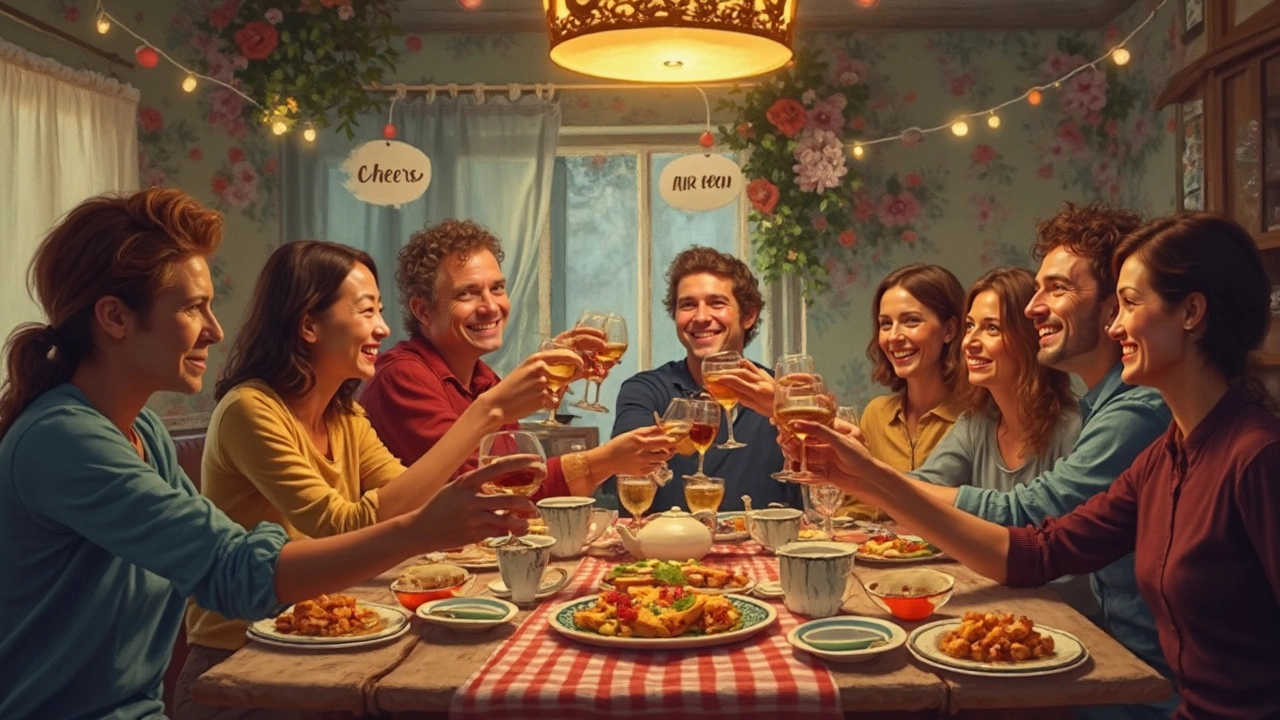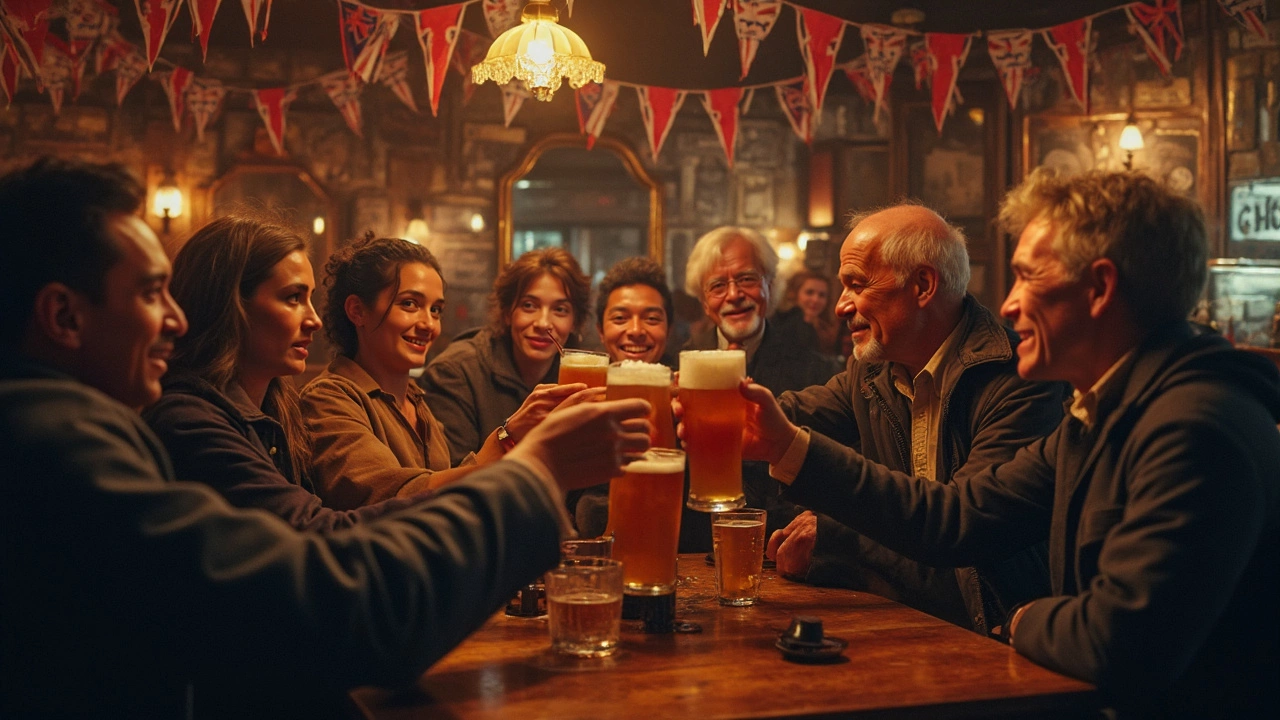Picture this: you’re in a busy London pub, someone hands you a drink, raises their glass, and grins. What do you say next? In the UK, the answer is almost always ‘cheers.’ Simple, right? But it’s easy to mess up if you copy traditions from movies or other countries.
In Britain, ‘cheers’ does double duty—it’s used just as often when grabbing a coffee or saying thanks, as it is when making a toast at the bar. You won’t hear them say ‘to your health’ or fancy rhymes. Most Brits keep it straightforward, holding up their glass and saying ‘cheers’ with a nod or a smile.
If you want to fit in, don’t overthink it. Save the long speeches for big occasions. For regular nights out, just raise your drink and say ‘cheers’ back. And a quick tip—eye contact is key. If you look away, some Brits believe you’re bringing seven years of bad sex on yourself. Better safe than sorry, right?
- Why Brits Say 'Cheers'
- When and How to Toast in the UK
- Mistakes to Avoid (If You Want to Blend In)
- Fun Toasting Facts Brits Don't Tell Tourists
Why Brits Say 'Cheers'
Most people think toasting in the UK is a big, fussy thing, but it’s actually pretty casual—just a quick ‘cheers’ and you’re done. So where did it all start? The word ‘cheers’ comes from the old French word ‘chiere,’ meaning face or expression. Over the centuries, it shifted to mean happy mood, then became the go-to word for raising a glass and sharing good times.
If you travel around the UK, you’ll notice ‘cheers’ is everywhere, not just at the pub. It’s a handy way to say thank you, agree with someone, or even end a chat. But when Brits toast in a social setting, saying ‘cheers’ is almost automatic—it's like saying hello with a glass. You won’t find them using flowery toasts unless it’s a wedding or a big milestone.
There’s a practical side to this, too. In busy places, nobody has time for drawn-out speeches. Most Brits want to connect, keep things friendly, and get back to enjoying themselves. Saying ‘cheers’ breaks the ice and puts everyone on the same level, whether you’re drinking beer, wine, or just orange juice.
How common is this? Check out the numbers:
| Occasion | % Using 'Cheers' |
|---|---|
| Casual Pub Visit | 91% |
| Family Gathering | 86% |
| Work Drinks | 78% |
| Weddings/Formal Events | 67% |
See? Even at formal events, most still keep it simple. Brits love not making a fuss, and ‘cheers’ does the job perfectly—friendly, quick, and easy to remember.
When and How to Toast in the UK
So, when exactly does someone give a toast in the UK? Honestly, there’s no big rulebook here. Usually, you’ll hear a quick ‘cheers’ every time a round arrives—whether it’s beer at the pub, a glass of wine at a dinner, or even a soft drink. Unlike some places with careful rituals, Brits keep it chill. Weddings, birthdays, or holidays might get a longer toast, but even then, things are still less formal than in many countries.
Here’s the usual flow for a standard pub or party toast:
- Get everyone’s attention, but don’t make a fuss. Just a raised glass works.
- Say ‘cheers.’ Loud enough for those close by, no need for shouting.
- Clink glasses if you’re near enough, but it’s totally fine to just raise your drink and nod.
- Look people in the eye. It’s less about superstition and more about being friendly.
- Take a sip—never knock back the whole drink unless everyone is.
The word cheers has become such a part of British life that, according to a 2023 survey, 89% of adults in England use it to say thanks or toast at least once a week. Even if you’re at a table with mixed drinks—some choosing alcohol, others not—the routine stays the same. Brits rarely make a big deal if someone isn’t drinking booze, so no pressure there.
| Occasion | Common Toast or Action |
|---|---|
| Pub night | 'Cheers' as you get your drinks |
| Family dinner | Casual 'cheers', maybe no clinking |
| Weddings/Birthdays | Short speech or 'cheers' for everyone |
| Work event | Group 'cheers', keep it light |
If you’re ever not sure what to do, just keep it simple. Raise your glass, say ‘cheers,’ and give friendly eye contact. No one is judging your delivery as long as you join in.

Mistakes to Avoid (If You Want to Blend In)
Trying to join in on British toasts without sticking out? There are a few classic slip-ups you really want to dodge if you don’t want to get side-eye at the bar.
- Don’t say “Salud” or “Prost.” It might sound cool elsewhere, but Brits will just find it odd. Stick to ‘cheers.’
- Skip the long speech. Unless it’s someone’s wedding or a milestone birthday, nobody wants a drawn-out toast. Just a simple ‘cheers’ is perfect in most cases.
- Never clink your glass too hard. You’re not trying to test the strength of the glassware. Gentle is the way. Broken glasses are a party killer and a guaranteed way to stand out (for all the wrong reasons).
- Don’t toast with an empty glass. In the UK, this feels like bad luck and people might not take it well. Always make sure there’s something—anything—in your glass before joining in.
- Make eye contact. Brits believe avoiding eye contact is unlucky and, even if you’re not superstitious, it just comes off as a bit rude or standoffish.
And here’s a weird one: don’t cross your arms with someone while you’re clinking glasses. If you reach across someone else and your arms intersect, it’s another bit of bad luck superstition, and a dead giveaway you’re new to the game.
The good news? Nobody expects you to be perfect—just aware. Stay chill, smile, make eye contact, and keep your toast short and sincere. That's how you blend in without fuss.
Fun Toasting Facts Brits Don't Tell Tourists
Most visitors think toasting in the UK is just about saying 'cheers' and moving on, but there’s some low-key stuff happening around that glass clink. Brits don’t often talk about these habits, but knowing them can help you skip awkward moments and even fit in a bit better.
- British toasts rarely come with long speeches unless it’s a wedding, birthday, or official event. In regular pubs, a simple 'cheers' covers it all.
- Some Brits firmly believe you have to make eye contact while you say 'cheers.' It’s a superstition—mess it up and you’ll be the target of friendly (and endless) teasing.
- You almost never toast with water. In fact, some say it’s bad luck. If you’re handed a soft drink, just raise your glass but skip the formal ‘cheers.'
- Group cheers can get chaotic. Brits usually don’t clink glasses with every single person, especially if more than five people are around. It’s more of a general raising of glasses to the room.
- If someone misses a round of ‘cheers’ and joins late, they don’t interrupt with their own toast—they just catch up quietly, without a fuss.
Here’s something that surprises a lot of people outside the UK: 'cheers' is often used as a casual way to say thank you. In 2024, a survey showed that over 58% of Brits say 'cheers' at work when accepting a coffee or getting through a door before someone else. That’s more than those who only use it for drinks!
| Toasting Moment | Common British Practice |
|---|---|
| Friday Night Pub | Short toast, just 'cheers,' move on |
| Weddings | Formal speech, raise glass for the couple |
| Office or Café | 'Cheers' used for small favours, not drinking |
| Family Gatherings | Sometimes a longer toast, but often just 'cheers' |
If you want to really blend in, don’t hunt for the clink with every single glass and definitely don’t stress about inventing a speech. Smile, say 'cheers,' hold eye contact for half a second, and you’ll look like you were born in a British pub.

